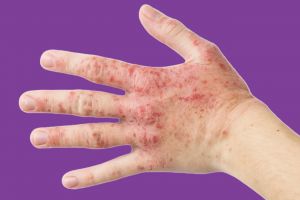Hand eczema
Hand eczema
ON THIS PAGE
Everything you need to know about
Hand eczema
Dry winter air or hot summer days are ideal triggers for hand eczema. Flares on your fingertips, on the other hand, can be itchy and uncomfortable. So pay special attention to certain areas of your body.
What are the symptoms of Hand Eczema?
Hand eczema causes red or dark brown itching skin. You may also notice on your hands:
- Pain
- Burning
- Peeling, flaking, and dryness
- Swelling
- Cracks
- Blisters
- Crusts or pus
- Bleeding
Common Types of Hand Eczema
Depending on the reason, many types of hand eczema might impact you:
- When you come into contact with something that irritates your skin, such as dust or chemicals, you get irritant contact dermatitis (or irritant eczema). You could catch it even if you wash your hands frequently. These factors can compromise your skin’s protective barrier, resulting in eczema.
- An allergic reaction to something in your environment causes allergic contact dermatitis (or allergic eczema). Nickel, perfumes, rubber, and some plants are all common causes.
- Dyshidrotic dermatitis (also known as pompholyx eczema) produces itching and watery blisters on your palms and fingers. This can occur in conjunction with a different type of eczema on another part of your body. It occurs in cycles and is most prevalent before the age of 40. The cause is unknown to doctors. However, metals, allergies, stress, heat, and sweating can aggravate the condition.
Living with Hand Eczema
-
Determine the cause. Ask your doctor if a “patch test” can be performed to determine what is causing your hand eczema symptoms. They can also assist you in determining whether something in your daily life, such as at work, is making things worse and what you can do to improve matters.
-
Reduce your handwashing. Only wash your hands when they’re dirty or germ-ridden, such as after using the restroom. When you wash your hands, you wash away some of the nutritious oils your skin produces. Also, choose soaps carefully because some include harsh ingredients. Instead of the word “soap,” look for products that say “gentle cleansing bars” or “lipid-free cleansers.” These are milder on skin that is sensitive. Remove your jewellery before washing. They have the ability to trap allergens adjacent to your skin. Before putting your rings back on, wash your hands with lukewarm water, pat them dry, and moisturise them. Carefully dry between your fingers and under your rings, where soap residue can linger and cause the skin to dry out or break.
-
Stay dry. You can also wash your hands without using water by rubbing your regular cleanser between dry hands and blotting it away with a soft towel. Hand sanitisers and waterless cleaners with irritating components such as alcohol or solvents should be avoided.
-
Wear disposable gloves. When doing housework or working with cleaners and chemicals, wear cotton-lined gloves. It’s better to avoid latex gloves because they can induce allergic responses. However, don’t use waterproof gloves for too long. They can cause eczema flare-ups by making your hands sweat. When handling citrus, tomatoes, onions, chilis, garlic, peppers, or meat, use disposable gloves.
-
Handle cracks with care. If a flare-up causes your hands’ skin to crack and bleed, try the “soak and smear” method. Soak your hands for 5 to 10 minutes in lukewarm water before patting them dry. Put on cotton gloves and apply a petroleum-based ointment to your hands. Glycerin-based ointments can also aid in the healing of dry, cracked skin.For at least 30 minutes, wear the gloves. Do this at least twice a day. Make sure to moisturise frequently if it’s difficult to do at work.
-
Reduce the shower’s intensity. A long, hot shower may seem like bliss to you, but it is anything but for your skin. To help avoid dry skin, take short, lukewarm showers every day or every other day. Use body washes with moisturising or moderate, soap-free cleansers. Instead of rubbing your skin dry after a shower, pat it. While you’re still damp, apply a thick moisturiser. Look for “fragrance-free” cleansers and moisturisers. Eczema flare-ups can be triggered by fragrance ingredients.
SCROLL DOWN FOR THE NEXT ARTICLE
NEXT ARTICLE


